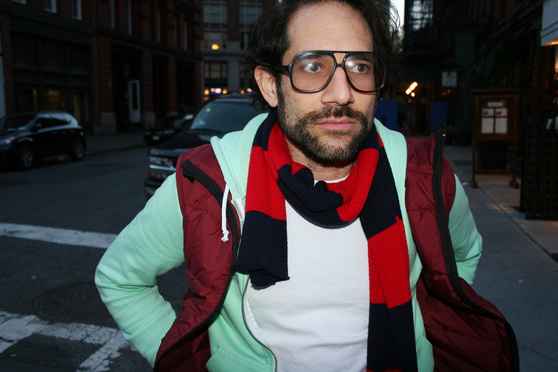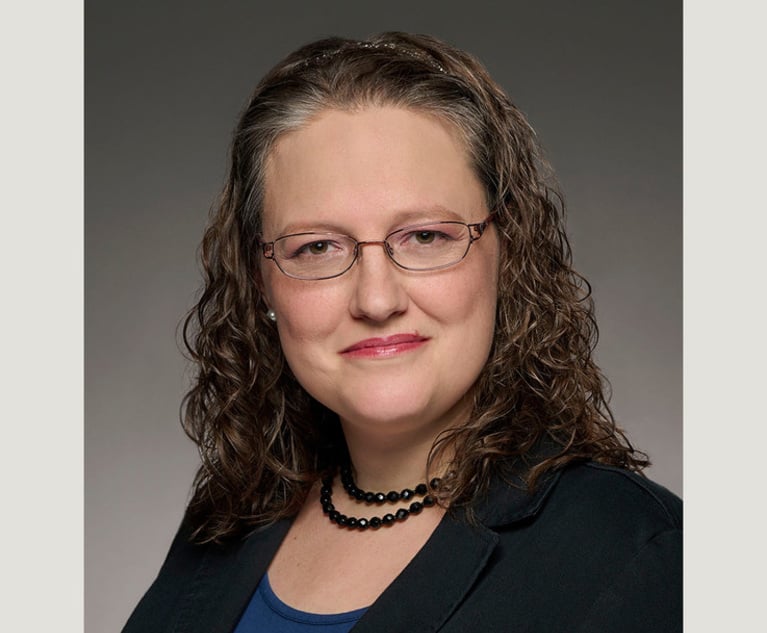Order Upheld Requiring Charney to Repay $19.5M in American Apparel Fight
The Delaware Supreme Court has affirmed a Delaware Court of Chancery ruling that required former American Apparel CEO Dov Charney to repay $19.5 million to a hedge fund in a dispute over money he owed from a failed fight to regain control of the company he helped to found.
September 25, 2018 at 06:00 PM
4 minute read
 Dov Charney, the founder and former CEO of American Apparel. Photo Credit: Dov Charney/Flickr
Dov Charney, the founder and former CEO of American Apparel. Photo Credit: Dov Charney/Flickr
The Delaware Supreme Court has affirmed a Delaware Court of Chancery ruling that required former American Apparel CEO Dov Charney to repay $19.5 million to a hedge fund in a dispute over money he owed from a failed fight to regain control of the company he helped to found.
A three-member panel of the high court on Monday affirmed the Dec. 19 decision by Chancellor Andre G. Bouchard, which upheld as valid a series of agreements Charney struck with Standard General shortly after his ouster over accusations of sexual harassment and mismanagement in 2014.
In a 65-page opinion, Bouchard had rejected Charney's claims that the New York-based investment firm duped him with promises it never intended to keep, and the judge slammed as “illogical” Charney's “kitchen sink” of defenses to Standard General's suit.
The Supreme Court did not hear oral argument's on Charney's appeal in August. The one-page order, signed by Justice James T. Vaughn Jr., instead confirmed Bouchard's decision on the briefs.
An attorney for Charney declined to comment, saying his firm had not been able to contact its client for permission to speak on the matter. An attorney for Standard General was not immediately available to comment on Tuesday.
Bouchard's ruling last December cleared the way for Standard General to recover a principal of $19.5 million, plus interest, on the loan that it made to Charney to help fund what turned out to be an unsuccessful proxy battle to retake his grip on American Apparel, which has since gone through two bankruptcies.
According to court documents, Charney borrowed the money in order to increase his holdings in the company to 43 percent so that he could launch a proxy contest to replace the board that had suspended him in the wake of the allegations. Charney denies any wrongdoing and maintains that the accusations against him were fabricated.
After the Los Angeles-based company pushed back, however, Charney, Standard General and American Apparel entered a standstill agreement that reconstituted the board and established a committee to investigate misconduct allegations and decide whether Charney should return to the board. Charney and Standard General separately signed a string of agreements to define their relationship over the months that followed.
The committee in December 2014 voted against reinstating Charney, and the new American Apparel board terminated his employment for cause, sparking a flurry of litigation in multiple forums.
In Delaware, Charney raised a slew of 11 affirmative defenses to Standard General's suit, arguing among other things that Standard General had fraudulently induced him with promises that he would return as CEO.
Bouchard, however, said that Charney's claims contradicted the plain terms of the agreements, which laid out a committee process to consider Charney's potential return and established limitations on the parties' voting power in light of the standstill agreement.
“I conclude that Charney could not have reasonably relied on any of these alleged false promises because they directly conflict with the terms of the eight written agreements he signed, and that his other affirmative defenses fail as a matter of law and undisputed fact,” Bouchard wrote.
The case, on appeal, was captioned Charney v. Standard General.
Charney was represented by Theodore A. Kittila of Halloran Farkas + Kittila.
Standard General was represented by Shannon Rose Selden, Derek Wikstrom and Justin Horton of Debevoise & Plimpton and Raymond J. DiCamillo and Matthew D. Perri of Richards, Layton & Finger.
This content has been archived. It is available through our partners, LexisNexis® and Bloomberg Law.
To view this content, please continue to their sites.
Not a Lexis Subscriber?
Subscribe Now
Not a Bloomberg Law Subscriber?
Subscribe Now
NOT FOR REPRINT
© 2025 ALM Global, LLC, All Rights Reserved. Request academic re-use from www.copyright.com. All other uses, submit a request to [email protected]. For more information visit Asset & Logo Licensing.
You Might Like
View All

Here's What Corporate Litigators Expect Delaware Courts to Address in 2025
6 minute read
Tesla, Musk Appeal Chancery Compensation Case to Delaware Supreme Court
2 minute read
Fed Judiciary Panel Mulls Authority to Ban In-State Bar Admission Requirements
Trending Stories
- 1'It's Not Going to Be Pretty': PayPal, Capital One Face Novel Class Actions Over 'Poaching' Commissions Owed Influencers
- 211th Circuit Rejects Trump's Emergency Request as DOJ Prepares to Release Special Counsel's Final Report
- 3Supreme Court Takes Up Challenge to ACA Task Force
- 4'Tragedy of Unspeakable Proportions:' Could Edison, DWP, Face Lawsuits Over LA Wildfires?
- 5Meta Pulls Plug on DEI Programs
Who Got The Work
Michael G. Bongiorno, Andrew Scott Dulberg and Elizabeth E. Driscoll from Wilmer Cutler Pickering Hale and Dorr have stepped in to represent Symbotic Inc., an A.I.-enabled technology platform that focuses on increasing supply chain efficiency, and other defendants in a pending shareholder derivative lawsuit. The case, filed Oct. 2 in Massachusetts District Court by the Brown Law Firm on behalf of Stephen Austen, accuses certain officers and directors of misleading investors in regard to Symbotic's potential for margin growth by failing to disclose that the company was not equipped to timely deploy its systems or manage expenses through project delays. The case, assigned to U.S. District Judge Nathaniel M. Gorton, is 1:24-cv-12522, Austen v. Cohen et al.
Who Got The Work
Edmund Polubinski and Marie Killmond of Davis Polk & Wardwell have entered appearances for data platform software development company MongoDB and other defendants in a pending shareholder derivative lawsuit. The action, filed Oct. 7 in New York Southern District Court by the Brown Law Firm, accuses the company's directors and/or officers of falsely expressing confidence in the company’s restructuring of its sales incentive plan and downplaying the severity of decreases in its upfront commitments. The case is 1:24-cv-07594, Roy v. Ittycheria et al.
Who Got The Work
Amy O. Bruchs and Kurt F. Ellison of Michael Best & Friedrich have entered appearances for Epic Systems Corp. in a pending employment discrimination lawsuit. The suit was filed Sept. 7 in Wisconsin Western District Court by Levine Eisberner LLC and Siri & Glimstad on behalf of a project manager who claims that he was wrongfully terminated after applying for a religious exemption to the defendant's COVID-19 vaccine mandate. The case, assigned to U.S. Magistrate Judge Anita Marie Boor, is 3:24-cv-00630, Secker, Nathan v. Epic Systems Corporation.
Who Got The Work
David X. Sullivan, Thomas J. Finn and Gregory A. Hall from McCarter & English have entered appearances for Sunrun Installation Services in a pending civil rights lawsuit. The complaint was filed Sept. 4 in Connecticut District Court by attorney Robert M. Berke on behalf of former employee George Edward Steins, who was arrested and charged with employing an unregistered home improvement salesperson. The complaint alleges that had Sunrun informed the Connecticut Department of Consumer Protection that the plaintiff's employment had ended in 2017 and that he no longer held Sunrun's home improvement contractor license, he would not have been hit with charges, which were dismissed in May 2024. The case, assigned to U.S. District Judge Jeffrey A. Meyer, is 3:24-cv-01423, Steins v. Sunrun, Inc. et al.
Who Got The Work
Greenberg Traurig shareholder Joshua L. Raskin has entered an appearance for boohoo.com UK Ltd. in a pending patent infringement lawsuit. The suit, filed Sept. 3 in Texas Eastern District Court by Rozier Hardt McDonough on behalf of Alto Dynamics, asserts five patents related to an online shopping platform. The case, assigned to U.S. District Judge Rodney Gilstrap, is 2:24-cv-00719, Alto Dynamics, LLC v. boohoo.com UK Limited.
Featured Firms
Law Offices of Gary Martin Hays & Associates, P.C.
(470) 294-1674
Law Offices of Mark E. Salomone
(857) 444-6468
Smith & Hassler
(713) 739-1250






